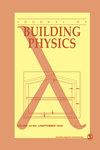Specification of a greenhouse in cold climate condition, mathematical model and optimization
IF 1.8
4区 工程技术
Q3 CONSTRUCTION & BUILDING TECHNOLOGY
引用次数: 0
Abstract
In order to optimize the energy requirements (heating/cooling) of a multi-zone greenhouse, and investigate its heat recovery potential, a mathematical, dynamic energy model, coded in the MATLAB/Simulink platform, is developed. For validation, a case study in cold climate conditions is evaluated. This dynamic model, based on both energy and water vapor mass balances, was able to calculate the year-round monthly energy demand for the case study. The model calculations were compared with actual energy consumption data and were shown to have an accuracy between 6% and 15.5% for different months. The results highlighted the potential of applying a heat recovery strategy, whether with a Phase Change Material (PCM) or a Heat Recovery Ventilator (HRV). It is shown that using a HRV can reduce the energy demand of the greenhouse by 5% for January and 4% for December. Regarding the greenhouse radiation performance, the south roof contributes the most to solar heat gain in winter and summer, while the north wall makes the minimum contribution. Consequently, it is proposed to increase the area of the south roof and insulate the north wall. Thus, an asymmetrical roof configuration can receive 6% more solar radiation. Calculations show that an east-west greenhouse orientation lowers energy demand by 3%.寒冷气候条件下温室的规格、数学模型和优化
为了优化多区温室的能源需求(供暖/制冷),并研究其热回收潜力,开发了一个在 MATLAB/Simulink 平台上编码的动态能源数学模型。为进行验证,对寒冷气候条件下的案例研究进行了评估。该动态模型基于能量和水蒸气质量平衡,能够计算出案例研究的全年每月能源需求。模型计算结果与实际能源消耗数据进行了比较,结果表明不同月份的精确度在 6% 到 15.5% 之间。结果凸显了应用热回收策略的潜力,无论是使用相变材料(PCM)还是热回收通风机(HRV)。结果表明,使用热回收通风设备可使温室的能源需求在 1 月份减少 5%,在 12 月份减少 4%。关于温室的辐射性能,南面屋顶在冬季和夏季对太阳辐射热量的贡献最大,而北面墙体的贡献最小。因此,建议增加南屋顶的面积,并对北墙进行隔热处理。这样,非对称屋顶结构可以多接收 6% 的太阳辐射。计算显示,东西朝向的温室可降低 3% 的能源需求。
本文章由计算机程序翻译,如有差异,请以英文原文为准。
求助全文
约1分钟内获得全文
求助全文
来源期刊

Journal of Building Physics
工程技术-结构与建筑技术
CiteScore
5.10
自引率
15.00%
发文量
10
审稿时长
5.3 months
期刊介绍:
Journal of Building Physics (J. Bldg. Phys) is an international, peer-reviewed journal that publishes a high quality research and state of the art “integrated” papers to promote scientifically thorough advancement of all the areas of non-structural performance of a building and particularly in heat, air, moisture transfer.
 求助内容:
求助内容: 应助结果提醒方式:
应助结果提醒方式:


